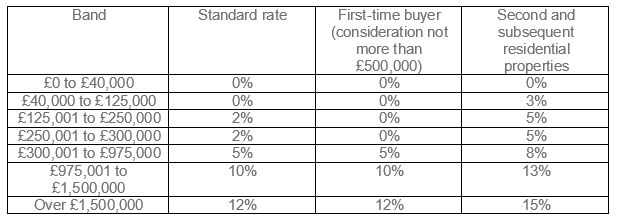BLOG
SDLT- How much will you pay?

Stamp duty land tax (SDLT) was the headline-grabbing measure in the Autumn Budget on 22 November 2017, with the announcement that first-time buyers will no longer have to pay SDLT on the first £300,000 when they buy their first home, as long as the purchase price does not exceed £500,000.
When it comes to SDLT, not everything is equal and the amount that you pay depends on whether you are a first-time buyer, have only one residential property, or whether you are buying a second or subsequent residential property.
SDLT is a stepped tax, being calculated at the appropriate rate on each slice of the consideration. The rates for residential properties are as follows:

First-time buyers
Lucy is a first-time buyer. She completes on her first home on 1 December 2017, which she buys for £400,000.
As the property does not cost more than £500,000, she pays SDLT at the first-time buyer rates as follows:

Not first-time buyers, only one residential property
Louise and John are moving to a new area. They have sold their previous home and complete on the sale of their new home on 1 December 2017. It is their only residential property. The new home costs £400,000.
The SDLT they must pay is calculated using the standard rates as follows:

Second and subsequent residential properties
Jake has a number of buy-to-let properties. He buys another property, costing £400,000 to add to his portfolio. The purchase completes on 1 December 2017. As Jake has more than one residential property and the new property is not replacing his main residence, he must pay the stamp duty supplement.
The SDLT payable is calculated as follows:

Paying the right rates
The amount of SDLT payable on a property costing £400,000 will range from £5,000 where the buyer is a first-time buyer to £22,000 where the buyer has at least one other residential property and the supplement applies. The SDLT payable at the standard rate in all other cases is £10,000.
Inform are here to help you so please contact us if you need further information on this or any other tax related matters.
Read more of Inform's tax blogs:
The Autumn Statement 2017 Statement- Tax Announcements
Is there a minimum period of occupation needed for main residence?



.jpg?width=1500&height=1000&name=amy-hirschi-K0c8ko3e6AA-unsplash-(5).jpg)

